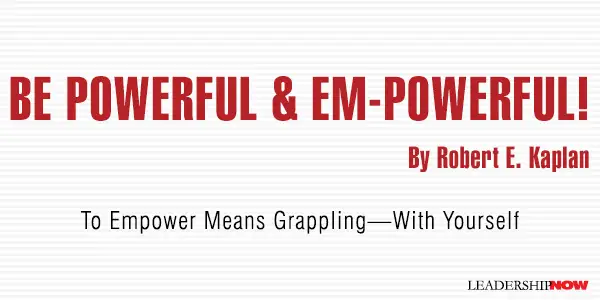Be Powerful & Em-Powerful!
EMPOWERMENT has become a buzzword that has lost its meaning. We all understand what being powerful—or, euphemistically, influential—looks like. But to be empowering—how clear is that?
Empowering is often misunderstood. For forceful leaders, it is perceived as giving power away; giving power to your staff is seen as relinquishing your power. It’s easy for forceful leaders to feel that empowering others diminishes their own power, or that they become “passive,” as one forceful leader described it.
Power is merely a means to achieve results. It should not matter whether it is your power or “Other” power. You can grind grain into flour by hand using a mortar and pestle, a practice humans have done since the beginning of agriculture. Alternatively, as people discovered centuries later, you can save yourself from manual labor by harnessing horses, water, or wind power to operate a mill.
Three Types of Empowerment
#1. Delegation. Delegating authority means allowing your team to do their jobs. Delegation of authority is not about abdication. It involves actively arranging for another source of power to be passed on to complete the task. It is about assigning authority and staying engaged as needed.
#2. Seeking counsel. Empowerment is not just about granting power downward. It also involves accepting input from those above you. Every leader is fallible and prone to making costly judgment errors, so there is value in seeking advice from your team, within limits.
While you might feel resistant and worry that seeking input on decisions that are yours to make is a sign of weakness, in reality, accepting input from your team can strengthen your judgment and enhance your power.
#3. Choosing strong team members. To effectively tap into external power, you need to have strong, capable individuals on your team. Your ability to be empowering is only as strong as the skills and energy of your team members permit. Just as you would choose a consistently windy location for a windmill, you must select the best people for your team.
Many leaders struggle to assemble high-quality teams. They may have poor judgment in identifying talent or may be hesitant to appoint the most qualified people due to insecurity. Leaders also sometimes fail to address staffing issues on the back end, holding onto ineffective team members out of loyalty or fear of making changes.
Empowering Means confronting Yourself
Do you resist sharing power, believing it would make you appear weak? Empowerment is sometimes considered “soft” and avoided by leaders who want to maintain a strong image.
If you hold this belief, you will struggle with empowerment. Similarly, if you believe that empowering others diminishes your managerial strength, you will face obstacles in executing empowerment strategies.
These biases and fears hinder your progress. Overcoming them requires inner reflection because it’s not easy to change entrenched beliefs or alleviate unfounded fears. Why not strive to be both powerful and empowering? It’s a worthwhile internal battle to engage in. (For more insights, check out my new book, GRAPPLING: Leaders Striving To Be Better, a collection of short stories that bring executive coaching principles to life.)
By having both direct and indirect sources of power at your disposal, you can maximize your impact. No matter how naturally powerful you are, embracing empowerment allows you to extend your influence and enable others to utilize their abilities fully.

Bob Kaplan is the author of GRAPPLING: Leaders Striving To Improve, a series of short stories that bring executive coaching to life. His unique style is both entertaining and offers a novel way of learning about leadership and self-improvement. The book is based on his decades of experience consulting CEOs and other senior leaders, including founders. He is the founder and president of his own leadership consulting firm, Kaplan DeVries. He invented a 360 survey, the Leadership Versatility Index, that earned a patent for its unique way of assessing leaders. He and his colleagues also take a unique approach to delivering feedback. They place unusually heavy emphasis on positive feedback—as a chance to boost the leader’s confidence. His last book was Fear Your Strengths: What You’re Best Could Be Your Biggest Problem. An honorary senior fellow at the Center for Creative Leadership, he has a B.A. and Ph.D. from Yale University. He lives in New York City with his wife, Becky. You can reach him at [email protected]

![]()


Posted by Michael McKinney at 08:29 AM
Permalink
| Comments (0)
| This post is about Management




